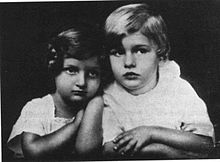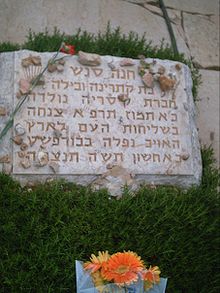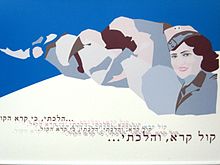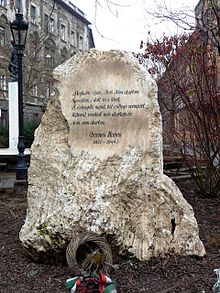- Hannah Szenes
-
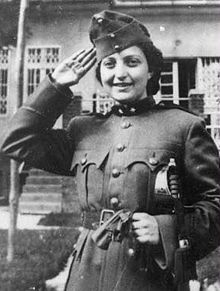 Hannah Szenes in a Hungarian army uniform as a Purim costume.
Hannah Szenes in a Hungarian army uniform as a Purim costume.
Hannah Szenes (Hebrew: חנה סנש) (Hungarian: Szenes Anikó), often anglicized as Hannah Senesh (July 17, 1921 – November 7, 1944) was a Hungarian Jew, one of 37 Jews from the British Mandate for Palestine (now Israel) that were trained by the British army to parachute into Yugoslavia during the Second World War in order to help save the Jews of Hungary, who were about to be deported to the German death camp at Auschwitz.[1]
Szenes was arrested at the Hungarian border, imprisoned and tortured, but she refused to reveal details of her mission and was eventually tried and executed by firing squad.[1] She is regarded as a national heroine in Israel, where several streets, the headquarters of the Zionist youth movements Israel Hatzeira and a kibbutz are named after her, and her poetry is widely known.
Contents
Early life
Szenes was born on July 17, 1921, to an assimilated Jewish family in Hungary. Her father, Béla Szenes, a journalist and playwright, died when she was six years old. She continued to live with her mother, Catherine, and her brother, György (George).
She enrolled in a Protestant private school for girls which also accepted Catholic and Jewish pupils; however, she had to pay twice the regular tuition because she was Jewish. This, along with the realization that the situation of the Jews in Hungary was becoming precarious, prompted Szenes to embrace Judaism. She announced to her friends that she had become a Zionist and joined Maccabea, a Hungarian Zionist students organization.
Immigrating to Nahalal
Szenes graduated in 1939 and decided to emigrate to what was then the British Mandate of Palestine in order to study in the Girls' Agricultural School at Nahalal. In 1941, she joined Kibbutz Sdot Yam and then joined the Haganah, the paramilitary group that laid the foundation of the Israel Defense Forces. In 1943, she enlisted in the British army in the Woman's Auxiliary Air Force as an Aircraftwoman 2nd Class and began her training in Egypt as a paratrooper for the British Special Operations Executive (SOE).
Arrest and torture
In March 1944, she and colleagues Yoel Palgi and Peretz Goldstein[1] were parachuted into Yugoslavia and joined a partisan group. After landing, they learned the Germans had already occupied Hungary, so the men decided to call off the mission as too dangerous.[1] Szenes continued on and headed for the Hungarian border. At the border, she and her companions were arrested by Hungarian gendarmes, who found her British military transmitter, used to communicate with the SOE and other partisans. Hannah was taken to a prison, stripped, tied to a chair, then whipped and clubbed for three days. The guards wanted to know the code for her transmitter so they could find out who the parachutists were and misdirect others. Transferred to a Budapest prison, Hannah was repeatedly interrogated and cruelly tortured, but she only revealed her name and refused to provide the transmitter code, even when her mother was also arrested. They threatened to kill her mother if she did not cooperate, but Hannah held firm (and probably saved her mother's life as a result).[1]
Whilst in prison, Szenes used a mirror to flash signals out of the window to prisoners in other cells and communicated using large cut-out letters that she placed in her cell window one at a time and by drawing the Magen David in the dust. She tried to keep their spirits up by singing, and through all the things Szenes went through she still kept her spirit high and stayed true to her mission.
Trial and execution
She was tried for treason on October 28, 1944. There was an eight-day postponement to give the judges more time to find a verdict, followed by another postponement, this one because of the appointment of a new Judge Advocate. She was executed by a firing squad.[2] She kept diary entries until her last day, November 7, 1944 when she was executed by a German firing squad. One of them read: "In the month of July, I shall be twenty-three/I played a number in a game/The dice have rolled. I have lost," and another: "I loved the warm sunlight."[1]
Her diary was published in Hebrew in 1946. Her remains were brought to Israel in 1950 and buried in the cemetery on Mount Herzl, Jerusalem. Her tombstone was brought to Israel in November 2007 and placed in Sdot Yam.[3]
During the trial of Rudolf Kastner, Hannah's mother, Catherina Senesh, testified that during the time her daughter was imprisoned, Kastner's people had advised her not to obtain a lawyer for her daughter. Further, she recalled a conversation with Kastner after the war, telling him, "I don't say that you could have saved my daughter Hannah, but that you didn't try - it makes it harder for me that nothing was done."[4] The book; "Hannah Senesh" by Israeli Poet Laureate, Avigdor Hameiri, who often fought along side Hannah, is required reading for all Israeli school children.
After the Cold War, a Hungarian military court officially exonerated her. Her kin in Israel were informed on November 5, 1993.
Poetry, songs and plays
Szenes was a poet and playwright, writing both in Hungarian and Hebrew. The following are four of her better known poems. The best known of these is Halikha LeKesariya ("A Walk to Caesarea"), commonly known as Eli, Eli ("My God, My God"). The well-known melody was composed by David Zahavi. Many singers have sung it, including Regina Spektor and Sophie Milman. It was used to close some versions of the film Schindler's List:
- My God, My God, I pray that these things never end,
- The sand and the sea,
- The rustle of the waters,
- Lightning of the Heavens,
- The prayer of Man.
- אלי, אלי, שלא יגמר לעולם
- החול והים
- רשרוש של המים
- ברק השמים
- תפילת האדם
- The voice called, and I went.
- I went, because the voice called.
The following lines are from the last poem she wrote, "Ashre Hagafrur", after she was parachuted into a partisan camp in Yugoslavia:
- ,אַשְׁרֵי הַגַּפְרוּר שֶׁנִּשְׂרַף וְהִצִּית לֶהָבוֹת
- .אַשְׁרֵי הַלְּהָבָה שֶׁבָּעֲרָה בְּסִתְרֵי לְבָבוֹת
- ...אַשְׁרֵי הַלְבָבוֹת שֶׁיָדְעוּ לַחְדוֹל בְּכָבוֹד
- .אַשְׁרֵי הַגַּפְרוּר שֶׁנִּשְׂרַף וְהִצִּית לֶהָבוֹת
- Blessed is the match consumed in kindling flame.
- Blessed is the flame that burns in the secret fastness of the heart.
- Blessed is the heart with strength to stop its beating for honor's sake.
- Blessed is the match consumed in kindling flame.
The following lines were found in Hanna's death cell after her execution:
- One - two - three... eight feet long
- Two strides across, the rest is dark...
- Life is a fleeting question mark
- One - two - three... maybe another week.
- Or the next month may still find me here,
- But death, I feel is very near.
- I could have been 23 next July
- I gambled on what mattered most, the dice were cast. I lost.
In popular culture
A film about Szenes' life entitled Hanna's War was released in 1988 and directed by Menahem Golan. She was portrayed by actress Maruschka Detmers.
See also
- Jewish Parachutists of Mandate Palestine
References
- ^ a b c d e f Hecht, Ben. Perfidy, first published by Julian Messner, 1961; this edition Milah Press, 1997, pp. 118-133. Hecht cites Bar Adon, Dorothy and Pessach. The Seven who Fell. Sefer Press, 1947, and "The Return of Hanna Senesh" in Pioneer Woman, XXV, No. 5, May 1950.
- ^ Baumel-Schwartz, Judith Tydor (2010). Perfect heroes: the World War II parachutists and the making of Israeli collective memory. University of Wisconsin Press. p. 30. ISBN 9780299234843. http://books.google.com/books?id=3_KNdfB3vrgC&pg=PA204&dq=%22Hannah+Szenes%22#v=snippet&q=firing%20squad&f=false.
- ^ Tombstone of WWII poet and spy Hannah Szenes arrives in Israel Haaretz, 25 November 2007
- ^ Hecht, Ben. Perfidy. 1961, p. 132
Bibliography
- Atkinson, Linda. In Kindling Flame: the Story of Hannah Senesh. Beech Tree Books, 1992.
- Hay, Peter. Ordinary Heroes: Chana Szenes and the Dream of Zion. G.P. Putnam's Sons, 1986.
- Ransom, Candice F. So Young to Die: the Story of Hannah Senesh. Scholastic, 1993.
- Senesh, Hannah, and Marge Piercy (foreword). Hannah Senesh: Her Life and Diary. Jewish Lights Publishing, 2004.
External links
- Teacher's Study Guide
- Hannah Senesh Legacy foundation
- Jewish Community Day School, Brooklyn, New York
- Blessed Is The Match, a documentary film about Hannah
- Hannah Szenes Biography at J-Grit: The Internet Index of Tough Jews
- "Eli, Eli": an example of a modern setting of this poem
Categories:- Hungarian people of World War II
- Hungarian Jews
- Hungarian emigrants to Israel
- Jews in Ottoman and British Palestine
- Female resistance members of World War II
- Women in World War II
- Jewish poets
- Women diarists
- Special Operations Executive personnel
- Executed spies
- Military personnel who died in the Holocaust
- 1921 births
- 1944 deaths
- Burials at Mount Herzl
- Spies who died in the Holocaust
Wikimedia Foundation. 2010.

